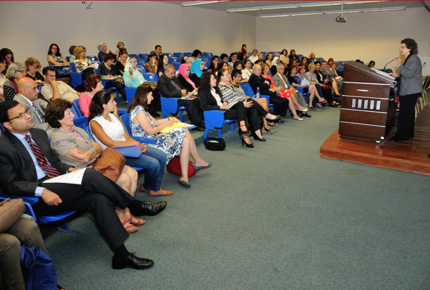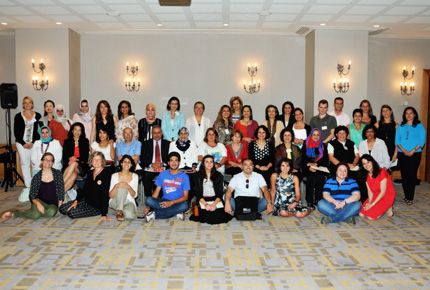Do constitutions bring about gender justice?
LAU’s IWSAW hosts an international conference on “Arab Countries in Transition: Gender Rights and Constitutional Reform.”

Constitutions do not only determine the relationship between the citizen and the state, they also shape society.

With continued collaboration society can safeguard and improve the legal, social, personal and political lives of women in the region,” said Dr. Aghacy.
Do constitutions bring about gender justice? What is the relationship between the law and gender justice? Do the law and the constitution hold sway in the face of cultural practices and beliefs?
These were some of the questions addressed at the international conference “Arab Countries in Transition: Gender Rights and Constitutional Reform,” that took place at LAU Beirut on June 23-25. The event, held under the patronage of the Minister of Education, Elias Abou Saab, was organized by the university’s Institute for Women’s Studies in the Arab World (IWSAW), in partnership with the Women and Memory Forum-Egypt, Konrad Adenauer Stiftung, Rule of Law Program MENA Region and the Danish Centre for Research and Information on Gender, Equality, and Diversity.
In his opening speech, LAU President Joseph G. Jabbra reminded the audience of the university’s commitment to women’s studies and the importance of the conference as a testimony of its legacy and values. LAU Provost George K. Najjar echoed Dr. Jabbra emphasized the university’s engagement towards gender equality in the region through the work done by IWSAW, its peer-reviewed publication al-Raida and its M.A. program in Women and Gender Studies, to begin in the fall.
“We need more rigorous studies and debates on democracy, personal freedoms and woman’s rights and how they intersect with religion and constitutional rights in the region,” stressed Dr. Samira Aghacy, IWSAW’s director. “At a time of rapid changes in the region, during and in the wake of the uprisings and revolutions and their dire effects on women’s lives, this was the appropriate moment to hold the conference,” she explained.
For Dr. Suad Joseph, professor of anthropology and women and gender studies at the University of California, Davis, constitutions do not only determine the relationship between the citizen and the state, but they also shape society. Her presentation was complemented by the co-founder of the Women and Memory Fund, Dr. Hoda Elsadda from Cairo University, who shared her practical experience in drafting the new Egyptian constitution in 2014. As one of the 50-member committee that drafted the text, Elsadda focused on the intricacies and complexities of the process and maintained that involving all components of Egyptian society in the committee ensured the democratization and overall acceptance of the new constitution.
“Constitutions by themselves do not provide true justice, but pave the way for it,” the expert said. As such, specialists discussed ways to go about this, in spite of legal contradictions, contestable laws, and socioeconomic and cultural factors that affect the enforcement of law.
Comparing the different constitutions in the Arab world and discussing their role in providing justice, participants explored factors that allow for women-friendly transitions and consolidations in the wake of Arab revolutions and uprisings. To that end some speakers tackled the Shari’a’s impact on women’s rights stressing the need to deconstruct male interpretations of the Islamic law. Violence against women was another major topic of the conference.
“With continued collaboration amongst women intellectuals, law-makers and activists in conferences such as these, all components of society — men and women alike — can safeguard and improve the legal, social, personal and political lives of women in the region,” Aghacy concluded.
More
Latest Stories
- Into the Psychology of Justice
- Alumnus Zak Kassas on Navigation, Spoofing and the Future of GPS
- Hearing Between the Lines
- LAU Hematology Conference 2025: Advancing Science Through Interdisciplinary Exchange
- Dr. Chaouki T. Abdallah Invested as LAU’s 10th President
- LAU Guides Its Students Through the Code of Conduct
- Innovative Procedure at LAU Medical Center–Rizk Hospital Signals Hope for a Patient With a Congenital Disease
- LAU’s Inaugural PodChat Session Addresses AI Detection in the Classroom

